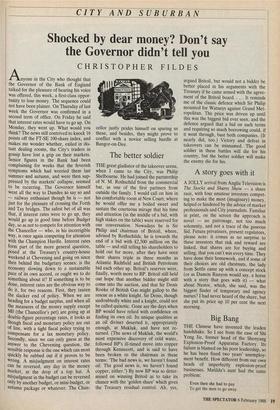CITY AND SUBURBAN
Shocked by dear money? Don't say the Governor didn't tell you
CHRISTOPHER FILDES
Anyone in the City who thought that the Governor of the Bank of England talked for the pleasure of hearing his voice was offered, this week, a first-class oppor- tunity to lose money. The sequence could not have been plainer. On Thursday of last week the Governor was confirmed in a second term of office. On Friday he said that interest rates would have to go up. On Monday, they went up. What would you think? The news still contrived to knock 16 points off the FT-SE 100-share index, and makes me wonder whether, exiled in dis- tant dealing rooms, the City's traders in gossip have lost a grip on their markets. Senior figures in the Bank had been complaining for weeks that the feverish symptoms which had worried them last summer and autumn, and were then sup- pressed by the markets' collapse, seemed to be recurring. The Governor himself went all the way to Dundee to say so and — railway enthusiast though he is — not Just for the pleasure of crossing the Forth and Tay bridges. The safest bet of all was that, if interest rates were to go up, they would go up in good time before Budget day, so as not to compete for attention with the Chancellor — who, in his incorrigible way, is once again competing for attention with the Champion Hurdle. Interest rates form part of the more general question, posed at the Treasury's country-house weekend at Chevening and going on since then behind the budgetary scenes: is the economy slowing down to a sustainable pace of its own accord, or ought we to do something about it? If something is to be done, interest rates are the obvious way to do it, for two reasons. First, they tauten the slacker end of policy. When we are heading for a budget surplus, and when all the measures of the money supply except MO (the Chancellor's pet) are going up at double-figure percentage rates, it looks as though fiscal and monetary policy are out of line, with a tight fiscal policy trying to compensate for a lax monetary policy. Secondly, since we can only guess at the answer to the Chevening question, the sensible response is the one which can most quickly be rubbed out if it proves to be wrong. A misjudgment on interest rates can be reversed, any day in the money market, at the drop of a top hat. A misjudgment in the budget can be reversed only by another budget, or mini-budget, or autumn package or whatever. The Chan- cellor justly prides himself on sparing us these, and besides, they might prove to conflict with a novice selling hurdle at Bangor-on-Dee.


















































 Previous page
Previous page